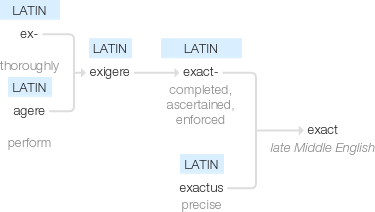Exact
late Middle English (as a verb): from Latin exact- ‘completed, ascertained, enforced’, from the verb exigere, from ex- ‘thoroughly’ + agere ‘perform’. The adjective dates from the mid 16th century and reflects the Latin exactus ‘precise’.
wiktionary
From Old French, from Medieval Latin exactare, from Latin exactus, perfect passive participle of exigō(“demand, claim as due" or "measure by a standard, weigh, test”), from ex(“out”) + agō(“drive”).
etymonline
exact (adj.)
"precise, rigorous, accurate," 1530s, from Latin exactus "precise, accurate, highly finished," past-participle adjective from exigere "demand, require, enforce," literally "to drive or force out," also "to finish, measure," from ex "out" (see ex-) + agere "to set in motion, drive, drive forward; to do, perform" (from PIE root *ag- "to drive, draw out or forth, move").
exact (v.)
"to force or compel to be paid or yielded," mid-15c., from Latin exactus, past participle of exigere "require, enforce, demand, collect (money);" see exact (adj.). Older in English than the adjective and retaining the literal sense of the Latin source. Related: Exacted; exacting.
